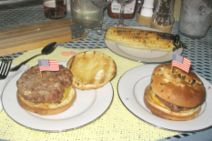Hamburger: Difference between revisions
imported>Hayford Peirce (added info, footnotes, and sources about its name and origin) |
imported>Subpagination Bot m (Add {{subpages}} and remove any categories (details)) |
||
| Line 1: | Line 1: | ||
{{subpages}} | |||
[[Image:4th_of_July_Burger.jpg|thumb|212px|Barbecued hamburgers and corn on the 4th of July are a quintessentially American meal.]] | [[Image:4th_of_July_Burger.jpg|thumb|212px|Barbecued hamburgers and corn on the 4th of July are a quintessentially American meal.]] | ||
| Line 10: | Line 12: | ||
*''Larousse Gastronomique'', Paul Hamlyn, London, 1961 edition | *''Larousse Gastronomique'', Paul Hamlyn, London, 1961 edition | ||
*''The American Heritage Cookbook and Illustrated History of American Eating & Drinking'', American Heritage Publishing Co., New York, 1964, Vol. 2 | *''The American Heritage Cookbook and Illustrated History of American Eating & Drinking'', American Heritage Publishing Co., New York, 1964, Vol. 2 | ||
Revision as of 15:33, 26 September 2007
A hamburger (or, less frequently, a hamburg) is a sandwich containing a patty of ground, cooked meat that is almost always beef. Its origin is almost certainly American, and, along with Coca-Cola, the hamburger was once disdainfully regarded by many non-Americans as the epitome of low cultural taste. With the advent of mass marketing from fast-food chains such as McDonald's and Burger King, however, hamburgers have now spread around the world and, with variations, are consumed in every culture. Generally considered to be an informal meal or a convenience food, its meat can be grilled, fried, broiled, microwaved, or steamed, and is almost always served with condiments such as ketchup or mustard inside a bun baked specially for hamburgers.
Many cultures over the centuries have cooked finely chopped or ground meats in shapes such as meatballs, patties, or steaks, often flavored with other ingredients. The Larousse Gastronomique, for instance, gives a half-dozen Hungarian, German, and Austrian recipes for what it calls Keftedes, all translated as variations on "hamburgers". [1] Most authorities consider that the word "hamburger" is derived from the German city of Hamburg, "a city that once enjoyed prosperous commerce with the Baltic Provinces in Russia, where shredded raw meat (we now know it as steak tartare) comprised a large part of the cuisine." [2] Around 1900, a popular meal in the United States was "Salisbury steak," cooked, ground steak, which was promoted by a food faddist named Dr. J. H. Salisbury as a cure for innumerable ailments. At some point in the late 19th or early 20th century hamburgers as we know them, cooked patties within a roll, made their first appearance in the United States, although exactly where and when is still debated.
References
Sources
- Larousse Gastronomique, Paul Hamlyn, London, 1961 edition
- The American Heritage Cookbook and Illustrated History of American Eating & Drinking, American Heritage Publishing Co., New York, 1964, Vol. 2
